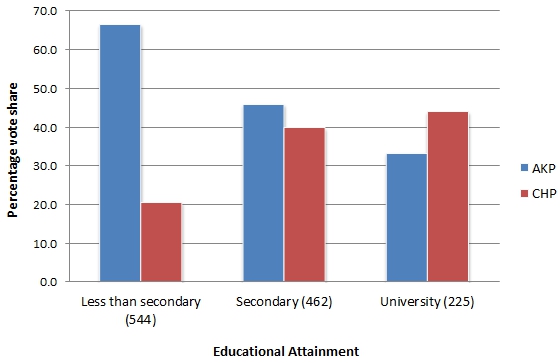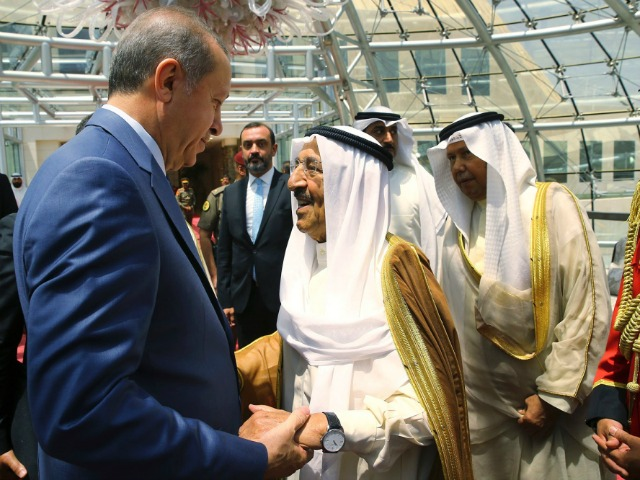Turkish President Recep Tayyip Erdogan delivered a speech Wednesday urging Muslims with higher educations to remain in Muslim countries to keep their earning potential and scientific achievements in the Muslim world, a message that appears at odds with his claim that Muslims are “Europe’s future.”
Erdogan’s remarks, delivered at a higher education conference in Ankara, follow a million-strong protest by the nation’s secularist opposition, which enjoys greater support among the younger, more educated Turks.
“This situation is definitely affected by reasons like not being able to give up on the life standards they got used to. But I believe that we, as heads of states, need to think of the real reasons that distance our youth from ourselves,” Erdoğan told the audience, according to the Turkish newspaper Hurriyet. “We need to carry measures that will prevent this brain drain, which is causing our science world to become a desert, into effect as soon as possible.”
“Brain drain” is a term used to describe mass migration of highly educated people out of developing and undeveloped countries into the free world, in many cases the United States. Educated citizens flee the country seeking a better quality of life elsewhere, but in doing so diminish the population of educated citizens who can contribute to the further development of their home economies.
“On top of that, we are transferring very serious amounts of money to Western countries for this. After these students complete their academic studies, we naturally expect them to return to their countries and serve their own people,” he continued. “But most of the time, those finishing their schools do not return to their homelands, but stay where they received education.”
Erdogan curiously did not blame those emigrating for the phenomenon, instead urging Muslim governments and social institutions to give these individuals reasons to stay. “Like in every society in the Muslim world, we stay away from issues that demand endeavor and patience,” he claimed. “If we are unsuccessful in raising a generation that asks, questions, and has ambitions for the future, a generation running after temporary whims emerges.”
“The most important responsibility falls on the shoulders of our universities. Universities are the production centers of science and unique and free thoughts. Every kind of idea that is not contaminated with terror and that does not encourage violence has a place and should have a place in the university,” he concluded.
Erdogan had previously praised growing Muslim populations in Europe. “From here I say to my citizens, I say to my brothers and sisters in Europe. … Educate your children at better schools, make sure your family live in better areas, drive in the best cars, live in the best houses,” he said in a speech in March. “Have five children, not three. You are Europe’s future.”
Erdogan has referred to the use of birth control by Turkish citizens as “treason,” while accusing Europe of “drowning in its own fears” of Muslims.
With these repeated demands to socially engineer the lives of Muslims, Erdogan has developed an image as a ruler seeking moral authority in the Muslim world. This week he added to that, demanding that the world’s Muslims storm Jerusalem’s Temple Mount, which led Israeli Foreign Ministry spokesman Emmanuel Nahshon to reply, “the days of the Ottoman Empire are over.”
A major hurdle to Erdogan’s aspirations become an Islamist moral authority is the fact that the Turkish population—particularly younger and more highly-educated Turks, the people he warns are moving to the West—are largely secular and have rejected Erdogan’s Islamist agenda.
The trend is not new. A 2014 study by the London School of Economics found a strong correlation between support for Erdogan’s Islamist Justice and Development Party (AKP) and lower education levels. Conversely, supporters of the secularist Republican People’s Party (CHP)—the party founded by Mustafa Kemal Atatürk—tended to be more educated than their peers.

A year later, a Pew study found that “younger, more educated Turks, followers of the opposition Republican People’s Party (CHP) and less devout Muslims are more disillusioned” with the state of democracy under Erdogan than their more pious, less educated peers, and more likely to oppose Erdogan generally. Meanwhile, “Erdogan’s supporters include AKP followers (87% favorable), Turks ages 50 and older (54%), lower educated Turks (53%) and Muslim Turks who pray 5 times per day or more (71%).”
The CHP appeared to prove this remains the case—two years, one failed coup, and one referendum to expand Erdogan’s powers later—with a rally this month that ended a march from Ankara to Istanbul meant to protest the mass arrests of civil workers, politicians, police officers, and soldiers following the failed coup. The rally featured a speech by CHP head Kemal Kilicdaroglu in which he referred to Turkey as a “dictatorship.” The CHP claimed the “Justice March” attracted one million people.
Erdogan’s Islamist quest has also resulted in severely distorted school curricula that team Islamic supremacy, significantly damaging the quality of Turkish education. In February, the Turkish ministry of education unveiled a new education curriculum that greatly increased Quranic and Islamic studies while removing the teaching of evolution, replacing Western scientists with Muslim ones, and limiting exposure to the ideas of the nation’s highly secular founding fathers. If this trend continues, educated Turks may increasingly find a home in the AKP, but only at the expense of a proper secular education—the kind that the Turkish economy needs them to have.

COMMENTS
Please let us know if you're having issues with commenting.